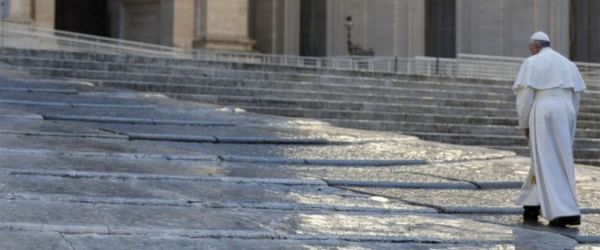The Gospel today (Mk 7:31-37) recounts Jesus’ healing of a man who was deaf and had a speech impediment, an incredible event that shows how Jesus reestablishes the full communication of man with God and with other people. The miracle is set in the region of the Decapolis, that is, in a completely pagan territory; thus, this deaf man who is brought before Jesus becomes the symbol of an unbeliever who completes a journey to faith. In effect, his deafness expresses the inability to hear and to understand, not just the words of man, but also the Word of God. And St Paul reminds us that “faith comes from what is heard” (Rom 10:17).
The first thing that Jesus does is take this man far from the crowd: He doesn’t want to publicize this deed he intends to carry out, but he also doesn’t want his word to be lost in the din of voices and the chatter of those around. The Word of God that Christ brings us needs silence to be welcomed as the Word that heals, that reconciles and reestablishes communication.
Then we are told about two gestures Jesus makes. He touches the ears and the tongue of the deaf man. To reestablish a relationship with this man whose communication is “impeded”, he first seeks to reestablish contact. But the miracle is a gift that comes from on high, which Jesus implores from the Father. That’s why he raises his eyes to the heavens and orders, “Be opened”. And the ears of the deaf man are opened, the knot of his tongue is untied and he begins to speak correctly (cf. v. 35).
The lesson we can take from this episode is that God is not closed in on himself, but instead he opens himself and places himself in communication with humanity. In his immense mercy, he overcomes the abyss of the infinite difference between him and us, and comes to meet us. To bring about this communication with man, God becomes man. It is not enough for him to speak to us through the law and the prophets, but instead he makes himself present in the person of his Son, the Word made flesh. Jesus is the great “bridge-builder” who builds in himself the great bridge of full communion with the Father.
But this Gospel speaks to us also about ourselves: Often we are drawn up and closed in on ourselves, and we create many inaccessible and inhospitable islands. Even the most basic human relationships can sometimes create realities incapable of reciprocal openness: the couple closed in, the family closed in, the group closed in, the parish closed in, the country closed in. And this is not from God! This is from us. This is our sin.
However, at the beginning of our Christian life, at baptism, it is precisely this gesture and word of Jesus that are present: “Ephphatha!” “Be opened!”. And behold the miracle has been worked. We are healed of the deafness of selfishness and the impediment of being closed in on ourselves, and of sin, and we have been inserted into the great family of the Church. We can hear God who speaks to us and communicates his Word to those who have never before heard it, or to the one who has forgotten it and buried it in the thorns of the anxieties and the traps of the world.
Let us ask the Virgin Mary, a woman of listening and of joyful testimony, that she sustain us in the commitment to profess our faith and to communicate the wonders of the Lord to those we find along our way.
[Pope Francis, Angelus 6 September 2015]












